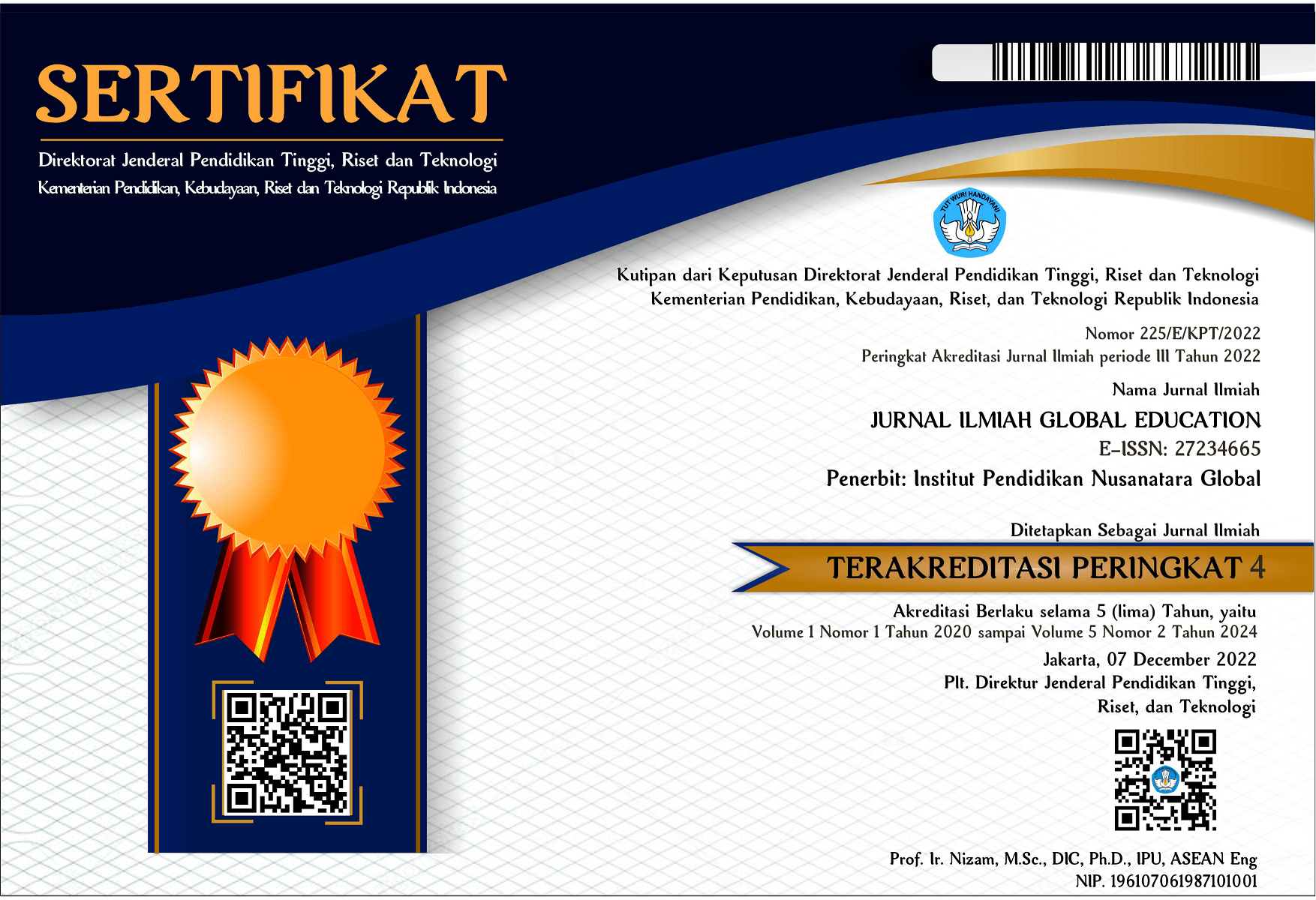Fostering Rural Tourism through Effective Homestay Management in Tebing Tinggi Okura
DOI:
https://doi.org/10.55681/jige.v5i4.3546Keywords:
Community-based tourism, Homestay management, Rural tourism, SWOT analysis, Sustainable tourism, Tourism developmentAbstract
This study employs a SWOT analysis to examine the potential of fostering rural tourism through effective homestay management in Tebing Tinggi Okura, a growing tourist village in Riau Province, Indonesia. The Strengths, Weaknesses, Opportunities, and Threats (SWOT) framework provides a comprehensive understanding of both internal and external factors influencing the development of homestays in this rural setting. Key strengths identified include the village's rich cultural heritage, authentic rural lifestyle, and the strong sense of community involvement in tourism initiatives. These factors make Tebing Tinggi Okura an attractive destination for visitors seeking unique cultural experiences. However, weaknesses such as inadequate infrastructure, limited professional hospitality training, and inconsistent service standards pose significant challenges to homestay quality and sustainability. On the opportunity side, the growing demand for eco-tourism and rural tourism presents a significant market potential. Additionally, the use of digital platforms for marketing and booking offers opportunities to reach broader audiences. The study also highlights potential threats, including competition from nearby rural destinations and environmental degradation risks due to increased tourism activity. By addressing weaknesses through capacity building, improving service standards, and leveraging digital marketing, Tebing Tinggi Okura can strengthen its position as a rural tourism destination. This research concludes that a community-driven approach, supported by local government and tourism stakeholders, is essential to ensure sustainable growth in rural homestays while preserving the village's cultural and natural assets.
Downloads
References
Bharadwaj, S. G., Varadarajan, P. R., & Fahy, J. (1993). Sustainable Competitive Advantage in Service Industries: A Conceptual Model and Research Propositions. Journal of Marketing, 57(4), 83. https://doi.org/10.2307/1252221
Chamhuri, S., & Islam, R. (2012). Home Stay Accommodation for Tourism Development in East Coast Economic Region Evaluation of ecology and genetic diversity of Shorea in Rehabilitated area of Kenaboi Forest Reserve View project Initiatives and Challenges of Agricultural Crop Sector in ECER Development Projects in Malaysia View project. https://www.researchgate.net/publication/235660255
El-Khadrawy, R., Attia, A., Khalifa, M., & Rashed, R. (2020). Sustainable Tourism and Culture: A Symbiotic Relationship. In International Journal of Environmental Science & Sustainable Development (Vol. 5). https://doi.org/10.21625/essd.v5i1.717.
Gallarza, M. G., Arteaga, F., & Gil-Saura, I. (2019). Customer value in tourism and hospitality: Broadening dimensions and stretching the value-satisfaction-loyalty chain. Tourism Management Perspectives, 31(February), 254–268. https://doi.org/10.1016/j.tmp.2019.05.011
Gerdt, S. O., Wagner, E., & Schewe, G. (2019). The relationship between sustainability and customer satisfaction in hospitality: An explorative investigation using eWOM as a data source. Tourism Management, 74(December 2018), 155–172. https://doi.org/10.1016/j.tourman.2019.02.010
Juliana, J; Parani, R., Irene, N., Sitorus, B., Pramono, R., & Maleachi, S. (2021). Study of Community Based Tourism in the District West Java. International Journal of Sustainable Development and Planning, 16(2), 277–285.
Juliana, J., & Antonio, F. (2022). Antecedents Of Memorable Rural Tourism Evidence From Indonesian Traveller. Jurnal Ecodemica Jurnal Ekonomi Manajemen Dan Bisnis, 6(1), 19–23.
Juliana, J., Pramezwary, A., Yuliantoro, N., Purba, J. T., Pramono, R., & Purwanto, A. (2021). Perceptions , Attitudes , and Interests of Halal Tourism : An Empirical Study in Indonesia. 8(7), 265–273. https://doi.org/10.13106/jafeb.2021.vol8.no7.0265
Juliana, Sihombing, S. O., & Antonio, F. (2022). What Drives Memorable Rural Tourism Experience: Evidence from Indonesian Travelers. International Journal of Sustainable Development and Planning, 17(8), 2401–2411. https://doi.org/10.18280/ijsdp.170807
Juliana, Sihombing, S. O., & Pramono, R. (2024). Spiritual Capital Tourism Economy Creative Woman Entrepreneur. International Journal of Religion, 5(1), 47–55. https://doi.org/10.61707/sbwdmq86
Juliana, Sihombing, S. O., & Suwu, S. E. (2023). Community-Based Ecotourism in Sawarna Tourism Village. Enrichment : Journal of Management, 13(1), 258–269. https://doi.org/10.35335/enrichment.v13i1.1192
Lemy, D.M., Pramono, R., J. (2022). Acceleration of environmental sustainability in tourism village. International Journal of Sustainable Development and Planning, 17(4): 1273-1283. https://doi.org/10.18280/ijsdp.170425.
López-sanz, J. M., Penelas-leguía, A., Gutiérrez-rodríguez, P., & Cuesta-valiño, P. (2021). Sustainable development and consumer behavior in rural tourism—the importance of image and loyalty for host communities. Sustainability (Switzerland), 13(9). https://doi.org/10.3390/su13094763
Muslin, M., Berliyanti, D. O., & Utha, M. A. (2023). Analysis of Homestay Guidelines and Stakeholder Engagement as Community Based Tourism. Journal of Social Research, 2(3), 997–1010. https://doi.org/10.55324/josr.v2i3.763
Pramezwary, Amelda , Lemy, Diena M. Juliana, Sitorus, Nova Bernedeta Masatip, Anwari , Dalimunthe, Femmy Indriany , Liyushiana, Yanti, D. (2022). Sustainability Gastronomy Tourism in Medan City. International Journal of Sustainable Development and Planning, 17(2), 399–411.
Romão, J., & Neuts, B. (2019). Sustainable tourism development in rural areas: Case studies and best practices. Sustainability, 11(15), 4119.
Saarinen, J., & Rogerson, C. M. (2021). Sustainable tourism in Southern Africa: Balancing economic, environmental, and social goals. Current Issues in Tourism, 24(10), 1369-1385.
Set, K., & Ray, K. (2021). Enhancing tourist satisfaction through service quality in rural homestays. Journal of Hospitality and Tourism Research, 45(3), 432-448.
Sharpley, R., & Telfer, D. J. (2018). Tourism and Development: Concepts and Issues. Channel View Publications.
Soeswoyo, D. M., Jeneetica, M., Dewi, L., Dewantara, M. H., & Asparini, P. S. (2021). Tourism Potential and Strategy to Develop Competitive Rural Tourism in Indonesia. International Journal of Applied Sciences in Tourism and Events, 5(2), 131–141. https://doi.org/10.31940/ijaste.v5i2.131-141
Subramaniam, N., Akbar, S., Situ, H., Ji, S., & Parikh, N. (2023). Sustainable development goal reporting: Contrasting effects of institutional and organisational factors. Journal of Cleaner Production, 411, 137339. https://doi.org/https://doi.org/10.1016/j.jclepro.2023.137339
Tasci, A. D. A. (2017). A quest for destination loyalty by profiling loyal travelers. Journal of Destination Marketing and Management, 6(3), 207–220. https://doi.org/10.1016/j.jdmm.2016.04.001
Tiberghien, G., Bremner, H., & Milne, S. (2020). Authenticity and disorientation in the tourism experience. Journal of Outdoor Recreation and Tourism, 30(June 2019), 100283. https://doi.org/10.1016/j.jort.2020.100283
Downloads
Published
How to Cite
Issue
Section
License
Copyright (c) 2024 Rosianna Sianipar, Juliana, Diena M. Lemy

This work is licensed under a Creative Commons Attribution-ShareAlike 4.0 International License.













